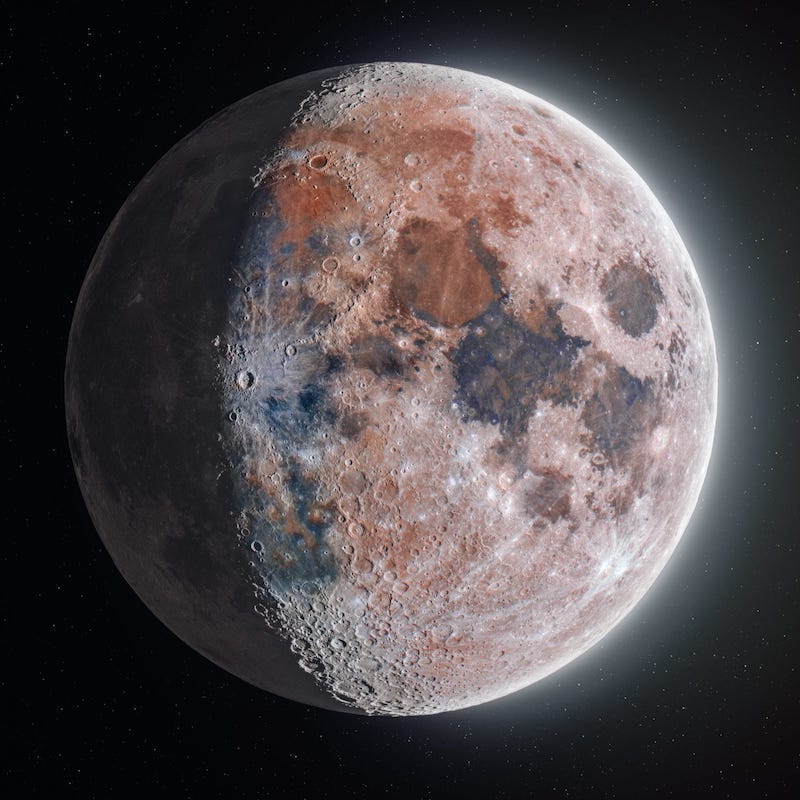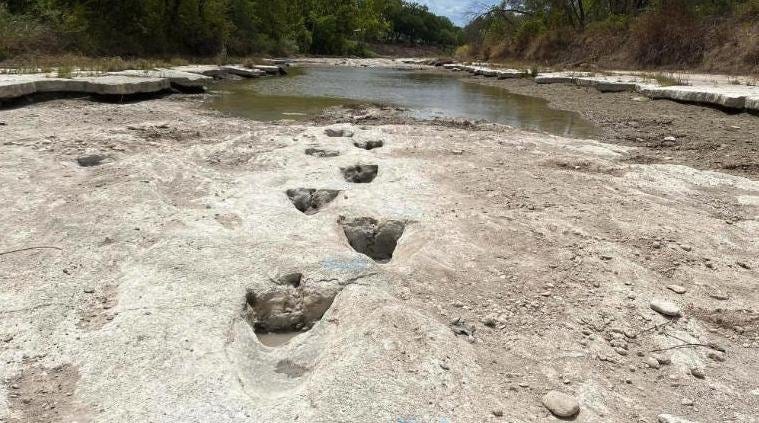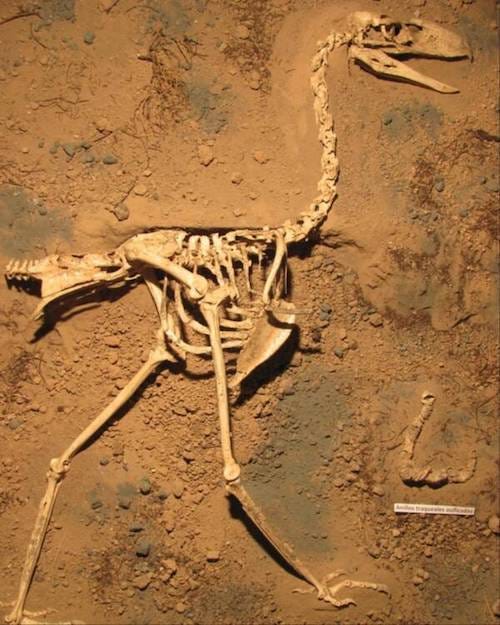The Weird Times: Issue 120, August 28, 2022 (V3 #16)
“The technique of infamy is to start two lies at once and get people arguing heatedly over which is the truth.”— Ezra Pound
“We’re all wind and dust anyway… We don’t even have any proof that the universe exists. We don’t have any proof that we are even sitting here. We can’t prove that we’re alive.”—Bob Dylan
“We are the people we emulate.”—Cleon Jones
I Shall Not Care
When I am dead and over me bright April
Shakes out her rain-drenched hair,
Tho' you should lean above me broken-hearted,
I shall not care.
I shall have peace, as leafy trees are peaceful
When rain bends down the bough,
And I shall be more silent and cold-hearted
Than you are now.
—Sara Teasdale (Set to music by Pearls Before Swine, 1973)
Books & Culture
I Really Didn’t Want to Write This Promotional Essay Tied to My Book Release: on the Public Consumption of Art, and How Not To Let It Consume You, Lauren Acampora, LitHub, 8/23/22: “Living in the so-called attention economy, we’re immersed in the constant noise of social media, the unrelenting tide of conversation and content.”
Missing Pages: the podcast revisiting jaw-dropping literary scandals: From the case of Dan Mallory to the story of Kaavya Viswanathan, literary critic Bethanne Patrick looks back on some of the strangest book scandals ever, David Smith, The Guardian, 8/23/22
Frederick Buechner was a writer tuned in to the frequency of grace, Michael Gerson, Washington Post, 8/22/22: “…he showed how a modern person, schooled in skepticism, pursued by appropriate doubts, could find the frequency of grace, as if he were tuning an old radio.”
Amanda Gorman Has Big Dreams: The 24-year-old, whose recitation of “The Hill We Climb” at the 2021 inauguration made her America’s most famous poet, has never met a mountain she couldn’t scale, Kaitlyn Greenidge, Harper’s Bazaar, 8/16/22
Exhibit reveals role of Black Americans in shaping film industry: ‘This history has never been shown:’ Seven decades of a complex history are on display in Los Angeles, revealing the counter narratives to racism created by Black actors and film-makers, Jireh Deng, The Guardian, 8/19/22
The Feminist Novelist Who Turned “On the Road” on Its Head: In “Tripticks,” the little-known British writer Ann Quin adopted the techniques of the Beats to playfully mock their machismo and deflate the romance of nineteen-sixties drug culture, Danielle Dutton, The New Yorker, 8/23/22
Stuck in a Spaceship: On The Expanse and Redrawing the Lines of a Body: Bodies in Space and Our Communal Body on Earth, Allison Wyss, LitHub, 8/23/22: “In the bleakness of the past few years, it was space TV that saved me.”
What If You Tried to Swallow a Whole Cloud? Ask an absurd question, and xkcd’s Randall Munroe will give you a (somewhat) serious answer. An exclusive excerpt from his upcoming What If? 2, Randall Munroe, Wired, 8/23/22
Voices of Rebirth: A Reading List on Being Indigenous in America: Our lives are so much more than you could possibly imagine, Autumn Fourkiller, Longreads, 8/23/22
How Early-2000s Pop Culture Changed Sex: Sophie Gilbert on intimacy, Game of Thrones, American Pie, and more, Isabel Fattal, The Atlantic, 8/23/22
Roberta Flack: A True “American Master,” Sharon Oliver, Culture Sonar, 8/22/22: “The First Time Ever I Saw Your Face” (1972 - written by Ewan MacColl)
The Erasure of Cartoons from HBO Max Also Removes a Prolific Moment of Animation History, Rendy Jones, Paste, 8/26/22
The Kids Are Alright: Scratch beneath the surface and it’s clear Gen Z are often conscientious and tolerant, Matt Major, Jacob L Mackey, Persuasion, 8/26/22
Sayaka Murata Inhabits a Planet of Her Own: The novelist makes the Earthly rituals of sex, marriage, childbirth—and all of human life—appear delightfully outlandish, Thu-Huong Ha, Wired, 8/25/22: “The worlds she invents are future-looking without adhering to the tropes of science fiction; her scenarios horrify without leaving the daylit quotidian spaces of home and office.”
101 Black Women Poets in Mainly White and Mainly Black Rooms, Marit J. MacArthur, Howard Rambsy II, Xiaoliu Wu, Qin Ding, Lee M. Miller, LA Review of Books, 8/27/22: “If presses like Graywolf, Norton, Four Way Books, and others matter most to print-based poetry, then popular YouTube channels like Button Poetry, The Strivers Row, and Write About Now matter most for the broader distribution of works by spoken word artists.” (Ed. Note: This is a very long article but really worthwhile to read in full.)
Eileen Myles Remembers Bobby Byrd: “His world was huge and specific,” Eileen Myles, LitHub, 8/22/22: “His poems were so good but it felt like he sang his actual existence. He was an all-the-time poet. It was a very nice pace. So it’s a selfish wish that makes me want to write about him now. I miss him, I miss Bobby-time and I always will and I can’t get it through my head that he’s not here. It’s too soon. And maybe it will always be that.”
A Poem for my 79th Birthday
Please
when it’s over
scatter my ashes
bones
whatever
in the Milky Way.
Thank you.
—Bobby Byrd
Politicks
Republican Governors Are a Threat to Democracy, Marc Elias, Democracy Docket, 8/23/22: “Republicans have nominated unapologetic election deniers to be their next governors in Arizona, Michigan and Pennsylvania.”
Abortion Rises in Importance as a Voting Issue, Driven by Democrats: Biden job approval remains low; a declining share of voters say he will be a factor in their midterm vote, Pew Research, 8/23/22
After Roe, teens are teaching themselves sex ed, because the adults won’t, Hannah Natanson, Washington Post, 8/23/22
What Adults Don't Get About Teens and Digital Life: Well-meaning messages meant to keep teens safe can backfire. The key is to focus on judgment and agency, not rigid rules for screen time, Emily Weinstein, Carrie James, Wired, 8/21/22
How a Secretive Billionaire Handed His Fortune to the Architect of the Right-Wing Takeover of the Courts: In the largest known political advocacy donation in U.S. history, industrialist Barre Seid funded a new group run by Federalist Society co-chair Leonard Leo, who guided Trump’s Supreme Court picks and helped end federal abortion rights, Andrew Perez, The Lever, Andy Kroll, Justin Elliott, ProPublica, 8/21/22
Of all the legal threats Trump is facing, is this the one that could take him down? The quiet workings of a Georgia grand jury hearing evidence of election fraud could represent the ex-president’s greatest danger, Chris McGreal, The Guardian, 8/27/22
Guilty Pleas In Biden Diary Theft Put Spotlight On Project Veritas, Josh Kovensky, Talking Points Memo, 8/25/22
On the wisdom of the historians: Just as in economics, beware untested theories, Noah Smith, Noahpinion, 8/26/22
Long Covid, The Long History Version: It's the tip of a long-term scandal in how we approach complex chronic conditions and post-viral syndromes, Zeynep Tufekci, Insight, 8/25/22
How Mondragon Became the World’s Largest Co-Op: In Spain, an industrial-sized conglomerate owned by its workers suggests an alternative future for capitalism, Nick Romeo, The New Yorker, 8/27/22
Starbucks creating ‘culture of fear’ as it fires dozens involved in union efforts: More than 85 workers heavily involved in organizing at coffee chain dismissed in recent months, says Starbucks Workers United, Michael Sainato, The Guardian, 8/25/22
Constantly Operating Factors: Stalin's Lessons for Putin, Lawrence Freedman, Comment is Freed, 8/24/22
“We're consumed with the materiality of life: maintaining our bodies, getting things done, going here, going there. But then, when these portals of almost clairvoyant empathy open up for us, they're amazing. That's what we look for in art—the moment when something comes rushing in. All you have to do is make yourself available, accessible, perhaps in ways you haven't done before.”—Dean Young
Science and Environment
How to destroy ‘forever chemicals’: cheap method breaks down PFAS: Disposing of these persistent substances often requires high pressures and temperatures, Giorgia Guglielmi, Nature, 8/18/22
How protecting public lands can help the climate: Conservation preserves forests, provides wildlife corridors, and protects water sources, YCC Team, Yale Climate Connections, 8/24/22
As many as one in six U.S. tree species is threatened with extinction: Some 100 native tree species could die out amid an onslaught of invasive insects, a surge in deadly diseases and the all-encompassing peril of climate change, Sarah Kaplan, Washington Post, 8/23/22
Dinosaur tracks dating back 113 million years revealed in drought-stricken river, Sheri Walsh, UPI, 8/23/22
Cow manure can be turned into renewable energy: Using systems called anaerobic digesters, YCC Team, Yale Climate Connections, 8/23/22
The Netherlands Is Building an Ark for Its Bees: Insect hotels. Rooftop gardens. “Honey highways.” With its National Pollinator Strategy, one country is showing the world how to save pollinators, Anne Pinto Rodrigues, Reasons to Be Cheerful, 8/25/22
How Scientists Are Cleaning Up Rivers Using Grasses and Oysters: In the Delaware River and other waterways across the US, conservationists are restoring aquatic vegetation and beds of bivalves to fight pollution, Katherine Rapin, Wired, 8/27/22
It’s Happened Before: Paleoclimate Study Shows Warming Oceans Could Lead to a Spike in Seabed Methane Emissions: Shallow deposits of frozen methane beneath oceans may be more vulnerable to thawing than previously known, Bob Berwyn, Inside Climate News, 8/23/22
This Startup Wants to Grow Rice in the Ocean: Using CRISPR to activate ancient genes, Alora’s plan could be key to our future food supply, Jacopo Prisco, Neo Life, 8/25/22
The Making of a Marine Pudding: In Ireland, a seaweed has a long culinary history, but its future lies in the hands of regular folks who enjoy a challenge, Chris Baraniuk, Hakai, 8/25/22
Scientists are racing to develop home tests that measure protection against Covid-19, Edward Chen, Stat, 8/23/22: “The new test uses a small amount of blood, obtained via a finger prick, that gets mixed with a buffer that contains the portion of the SARS-CoV-2 spike protein that binds to the ACE2 receptor on human cells.”
Dogs produce tears when reunited with owners, study finds: Research is first to demonstrate positive emotion provoking tears in a non-human, Nicola David, The Guardian, 8/22/22
Zapping the brain with electricity shown to boost older people’s short- and long-term memory, Megan Molteni, Stat, 8/22/22
This company is about to grow new organs in a person for the first time: A volunteer with severe liver disease will soon undergo a procedure that could lead them to grow a second liver, Jessica Hamzelou, MIT Technology Review, 8/25/22
Polio Is Back in the US and UK. Here’s How That Happened: For every person paralyzed, hundreds or thousands could be infected. It’s a setback for the long-overdue plan to eradicate the virus from the world, Maryn McKenna, Wired, 8/24/22
NASA’s Artemis 1 mission to the Moon sets the stage for routine space exploration beyond Earth’s orbit – here’s what to expect and why it’s important, Jack Burns, The Conversation, 8/26/22
We Just Found a 'Super-Earth' That Could Be an Ocean-Covered Water World, Michelle Starr, Science Alert, 8/26/22
Webb telescope is already challenging what astronomers thought they knew: Surprisingly massive distant galaxies raise questions about early galaxy formation, Joel Achenbach, Washington Post, 8/26/22
What Drives Galaxies? The Milky Way’s Black Hole May Be the Key: Supermassive black holes have come to the fore as engines of galactic evolution, but new observations of the Milky Way and its central hole don’t yet hang together, Thomas Lewton, Quanta, 8/23/22
‘Levitating’ nanoparticles could push the limits of quantum entanglement: Interaction between glass spheres suspended in a vacuum might one day lead to advances in quantum computing, Davide Castelvecchi, Nature, 8/25/22
The world's first 100% hydrogen-powered train starts running in Germany: Just 1 kilo of hydrogen fuel can do the same as around 9.9 pounds of diesel, Nergis Firtina, Interesting Engineering, 8/25/22
This power line could save California — and forever change the American West, Sammy Roth, LA Times, 8/23/22
There’s a water crisis. Why do we still have lawns? An American dream meets a changing landscape, Dan Zak, Washington Post, 8/24/22
As Colorado River Dries, the U.S. Teeters on the Brink of Larger Water Crisis: The megadrought gripping the western states is only part of the problem. Alternative sources of water are also imperiled, and the nation’s food along with it, Abrahm Lustgarten, ProPublica, 8/25/22
Inside Clean Energy: The Idea of 100 Percent Renewable Energy Is Once Again Having a Moment: Wind, solar and other renewable sources could supply all of the world’s energy, according to a growing body of research, Dan Gearino, Inside Climate News, 8/25/22
Along the grain of marble where the leaves grow slack and start
to drop
the Autumn cascade in stone pulses blue as breathing under
its skin
—Kenneth Irby, from “Studies: Cuts Shots Takes” (2001)
Birds on the Wire
Why Terror Birds Were The Most Fearsome Prehistoric Predators You’ve Never Heard Of: For much of the Cenozoic Era, terror birds dominated South America and hunted with hatchet-like beaks — until they went extinct about 2 million years ago, Kaleena Fraga, All That’s Interesting, 8/26/22
Without enough horseshoe crabs, a threatened bird could go extinct, Jay Watson, The Trentonian, 8/25/22: “…the red knot, a sandpiper that can migrate 9,000-plus miles, from the tip of Tierra Del Fuego in South America to the Arctic tundra in Canada. Gorging on nutrient-rich horseshoe crab eggs along the Delaware Bayshore allows the exhausted birds to quickly double their body weight and gain enough strength to complete their journey to nest and raise young in the north.”
‘We’re nervous.’ Deadly bird flu may be in North America to stay: H5N1 has continued to kill wild birds and poultry this summer. The fall migration could bring it back in force, Erik Stokstad, Science, 8/23/22
The stork and the farmer: A conservation parable with lessons from Nepal, Abhaya Raj Joshi, Monga Bay, 8/24/22: “…woolly necked storks are for the most part unafraid of farmers, and that traditional farming contributes to maintaining their important habitats.”
You take my hand, I'll take your hand.
Together we may get away.
This much madness is too much sorrow.
It's impossible to make it today.
—from “Down by the River,” Neil Young
It’s been a busy week for news, especially environment, space, science and technology, so this week’s issue leans heavily in that direction. I assume most of you are aware of the political news, so while not ignoring that tranche of information altogether, I am featuring less of it, especially knowing that after Labor Day, political news will be immersive.
The most important news always comes from poets, writers, artists, and songwriters anyway. Stay attuned. Stay in touch. Much love to all who are reading this. You are in my thoughts every day.
“The best endings are abrupt.”






